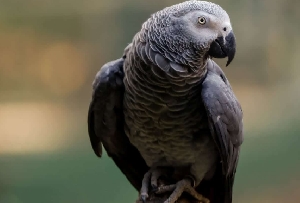 Eight parrots at a UK wildlife park are undergoing rehabilitation for mimicking swear words
Eight parrots at a UK wildlife park are undergoing rehabilitation for mimicking swear words
Five African grey parrots, who gained notoriety in a UK wildlife park for swearing at visitors and staff, were on Tuesday integrated into a larger flock after they were initially isolated as a result of their antics.
In 2020, Face2Face Africa reported that the five birds – Eric, Jade, Elsie, Tyson, and Billy – were donated to the Lincolnshire Wildlife Park in Friskney by their respective owners in the space of a week. The birds, who were quarantined together prior to being displayed in public, quickly developed a habit of hurling expletives at people.
“It just went ballistic, they were all swearing,” Steve Nichols, the facility’s chief executive, told CNN at the time. “We were a little concerned about the children.” “I get called a fat t**t every time I walk past,” Nichols added.
According to CNN, the wildlife park recently came up with a rehabilitation plan for the five birds as well as three other parrots who also cannot get enough of swearing. The eight birds were on Tuesday integrated into a flock of other 92 parrots who don’t echo rude language.
“When we came to move them, the language that came out of their carrying boxes was phenomenal, really bad. Not normal swear words, these were proper expletives,” Nichols told the news outlet. “We’ve put eight really, really offensive, swearing parrots with 92 non-swearing ones.”
Nichols said a successful rehabilitation would mean that the eight “usual suspects” could pick up “all the nice noises like microwaves and vehicles reversing” the 92 parrots mimic. Nichols, however, said “it’s going to turn into some adult aviary” should the other 92 parrots learn the swear words.
He also said there was great success when the five original parrots were moved to the flock after they were isolated. The facility’s chief executive, however, said the parrots sometimes use the swear words and proceed to laugh.
He further told CNN that parrots mimic what they hear. As a result, “six of them have got men’s voices, two of them have got ladies’ voices and when they’re all swearing it does sound really bad.”
Nichols said they have since mounted huge signs to alert visitors about the parrots’ choice of words, though they are yet to get a complaint. He also made mention of previous incidents, stating that they “did hear a lot more customers swearing at parrots than we did parrots swearing at customers.”
Touted for their intelligence and ability to effortlessly impersonate human voices, African grey parrots are the largest of their species in Africa and also one of the most popular pet birds globally. In 2018, however, the International Union for Conservation of Nature listed the species as endangered.
The park also said it hopes the swear-happy birds would be rehabilitated during their integration with the larger flock.
“I’ve just left them up there and there’s lots of noises, which is brilliant … from squeaking gates to doors slamming, people laughing and mobile phones,” said Nichols. “I’m hoping that’s part of the settling-in period, but I don’t think they will ever lose the swear because as soon as somebody swears, they’ll be swearing as well.”